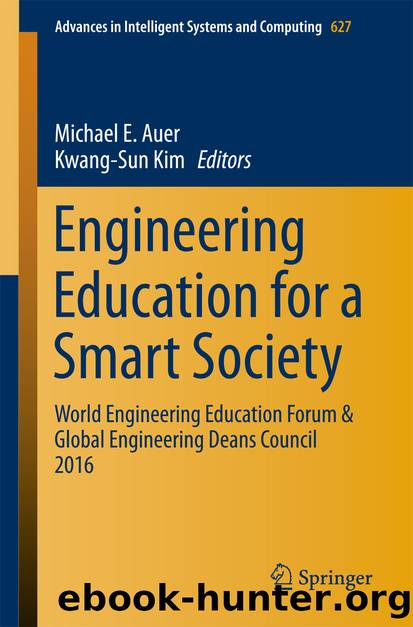Engineering Education for a Smart Society by Michael E. Auer & Kwang-Sun Kim

Author:Michael E. Auer & Kwang-Sun Kim
Language: eng
Format: epub
Publisher: Springer International Publishing, Cham
2.1.3 Radical Constructivism
Radical constructivism represents the opposite end of the constructivist continuum from cognitive constructivism. Radical constructivism fully embraces the first three epistemological principles (1-2-3), that is, that knowledge acquisition is an adaptive process that results from active cognizing by the individual learner, rendering an experientially based mind, rather than a mind that reflects some external reality.6 These particular epistemological emphases lead to defining principles that maintain the internal nature of knowledge and the idea that, while an external reality may exist, it is unknowable to the individual. Reality is unknowable since our experience with external forms is mediated by our senses, and our senses lack deftness at rendering an accurate representation of these external forms (e.g., objects, social interactions).
Radical constructivism has long been considered a “strong” form of constructivism, as it fully embraces three (1-2-3) of the constructivist epistemological principles and at least partially embraces the fourth. That is, radical constructivism is concerned with the construction of mental structures, the position of cognitive constructivists and the construction of personal meaning (Fig. 3).
Fig. 3.The indicative emphases of the four essential principles (radical constructivism)
Download
This site does not store any files on its server. We only index and link to content provided by other sites. Please contact the content providers to delete copyright contents if any and email us, we'll remove relevant links or contents immediately.
Algorithms of the Intelligent Web by Haralambos Marmanis;Dmitry Babenko(16509)
Jquery UI in Action : Master the concepts Of Jquery UI: A Step By Step Approach by ANMOL GOYAL(9519)
Test-Driven Development with Java by Alan Mellor(7741)
Data Augmentation with Python by Duc Haba(7616)
Principles of Data Fabric by Sonia Mezzetta(7384)
Learn Blender Simulations the Right Way by Stephen Pearson(7299)
Microservices with Spring Boot 3 and Spring Cloud by Magnus Larsson(7146)
Hadoop in Practice by Alex Holmes(6611)
RPA Solution Architect's Handbook by Sachin Sahgal(6521)
The Infinite Retina by Robert Scoble Irena Cronin(6224)
Big Data Analysis with Python by Ivan Marin(5948)
Life 3.0: Being Human in the Age of Artificial Intelligence by Tegmark Max(5521)
Pretrain Vision and Large Language Models in Python by Emily Webber(4902)
Infrastructure as Code for Beginners by Russ McKendrick(4661)
Functional Programming in JavaScript by Mantyla Dan(4455)
WordPress Plugin Development Cookbook by Yannick Lefebvre(4396)
The Age of Surveillance Capitalism by Shoshana Zuboff(4260)
Embracing Microservices Design by Ovais Mehboob Ahmed Khan Nabil Siddiqui and Timothy Oleson(4153)
Applied Machine Learning for Healthcare and Life Sciences Using AWS by Ujjwal Ratan(4144)
